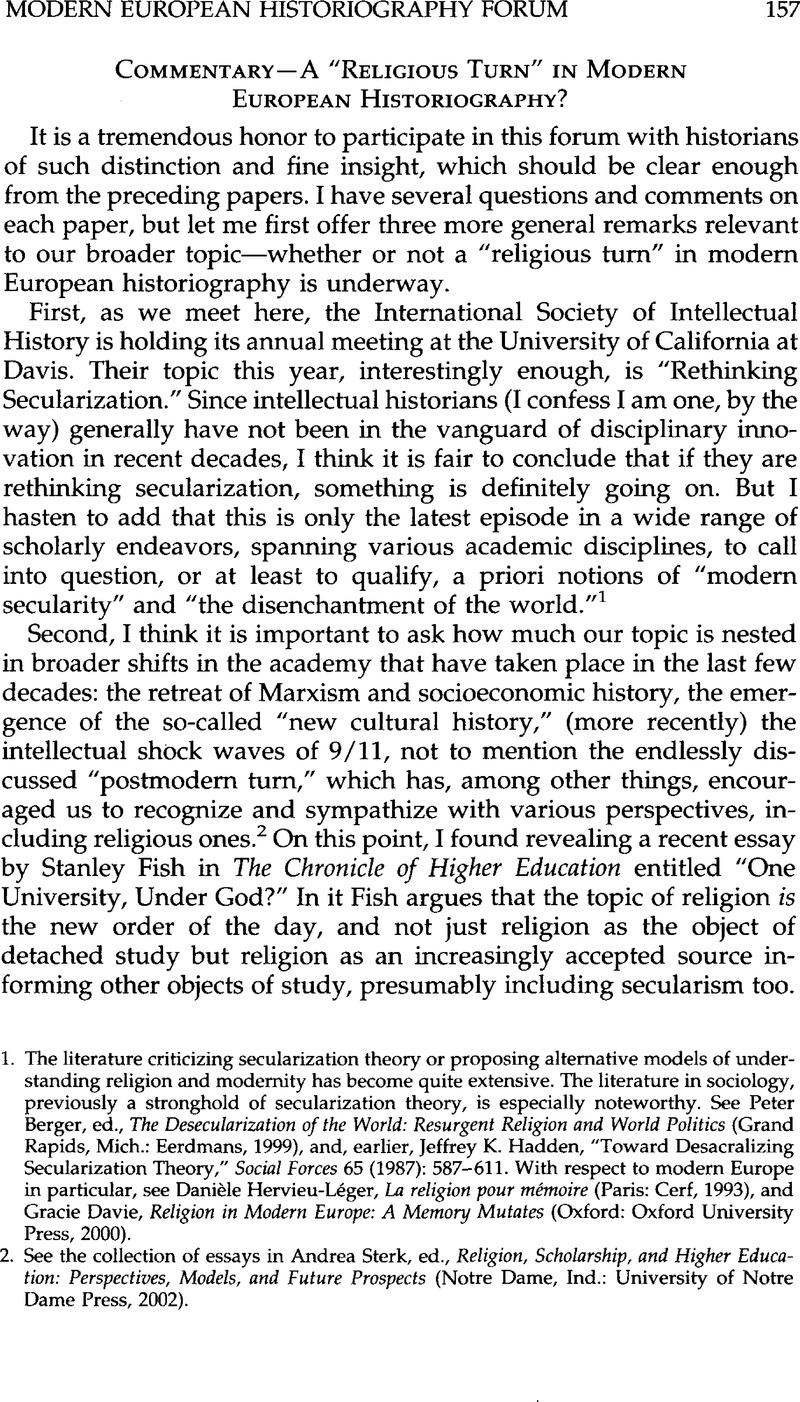Article contents
Commentary — A “Religious Turn” in Modern European Historiography?
Published online by Cambridge University Press: 28 July 2009
Abstract

- Type
- Modern European Historiography Forum
- Information
- Copyright
- Copyright © American Society of Church History 2006
References
1. The literature criticizing secularization theory or proposing alternative models of understanding religion and modernity has become quite extensive. The literature in sociology, previously a stronghold of secularization theory, is especially noteworthy. See Peter, Berger, ed., The Desecularization of the World: Resurgent Religion and World Politics (Grand Rapids, Mich.: Eerdmans, 1999)Google Scholar, and, earlier, Hadden, Jeffrey K., “Toward Desacralizing Secularization Theory,” Social Forces 65 (1987): 587–611CrossRefGoogle Scholar. With respect to modern Europe in particular, see Hervieu-Léger, Danièle, La religion pour mémoire (Paris: Cerf, 1993)Google Scholar, and Davie, Gracie, Religion in Modern Europe: A Memory Mutates (Oxford: Oxford University Press, 2000).Google Scholar
2. See the collection of essays in Sterk, Andrea, ed., Religion, Scholarship, and Higher Education: Perspectives, Models, and Future Prospects (Notre Dame, Ind.: University of Notre Dame Press, 2002).Google Scholar
3. Fish, Stanley, “One University, under God?,” The Chronicle of Higher Education (7 January 2005): C4.Google Scholar
4. I have suggested an enormous bibliography. See, for example, Caroline, Ford, “Religion and Popular Culture in Modern Europe,” Journal of Modern History 65 (03 1993): 152–75Google Scholar; Blackbourn, David, “The Catholic Church in Europe since the French Revolution: A Review Article,” Comparative Studies in Society and History 33 (10 1991): 778–90CrossRefGoogle Scholar; Hartmut, Lehmann, ed., Koexistenz und Konflikt von Religionen im vereinten Europa (Göttingen: Wallstein, 2004)Google Scholar; Hartmut, Lehmann, ed., Religöser Pluralismus im vereinten Europa: Freikirchen und Sekten (Göttingen: Wallstein, 2005)Google Scholar; and Hunter, Shireen T., ed., Islam, Europe's Second Religion (Westport, Conn.: Praeger, 2002).Google Scholar
5. I have especially benefited from Cox, , “Secularization and Other Master Narratives of Religion in Modern Europe,” Kirchliche Zeitgeschichte 14 (2001): 23–34.Google Scholar
6. Howard, Thomas Albert, “A ‘Religious Turn’ in Modern European Historiography?,” Historically Speaking 4 (06 2003): 25–26CrossRefGoogle Scholar. I would qualify my criticism, however, by noting that a number of individual monographs in modern intellectual history suggest that religion is beginning to be dealt with more seriously. For example, see Sheehan, Jonathan, The Enlightenment Bible: Translation, Scholarship, Culture (Princeton, N.J.: Princeton University Press, 2005)Google Scholar; Williamson, George S., The Longing for Myth in Modern Germany: Religion and Aesthetic Culture from Romanticism to Nietzsche (Chicago: University of Chicago Press, 2004)Google Scholar; and Howard, Thomas Albert, Religion and the Rise of Historicism (Cambridge: Cambridge University Press, 2000)Google Scholar, and Protestant Theology and the Making of the Modern German University (Oxford: Oxford University Press, forthcoming, 2006).Google Scholar
7. Cf. Davie, Gracie, Europe—The Exceptional Case: Parameters of Faith in the Modern World (London: Longman and Todd, 2002)Google Scholar, and Lehmann, Harrmut, Säkularisierung: der europäische Sonderweg in Sachen Religion (Göttingen: Wallstein, 2004).Google Scholar
8. Cf. Lehmann, Hartmut, “A Plea for the Comparative Study of Religion in a Transatlantic Perspective,” in Lehmann, Alter und Neue Welt in wechselseitiger Sicht: Studien zu den transatlantischen Beziehung (Göttingen: Vandenhoeck and Ruprecht, 1995), 251–56Google Scholar; and Lehmann, Hartmut, “The Role of Religion in Germany and America in the Nineteenth and Twentieth Centuries,” in Bridging the Atlantic: The Question of American Exceptionalism in Perspective, ed. Elizabeth, Glaser and Hermann, Wellenreuter (Cambridge: Cambridge University Press, 2002), 69–81.CrossRefGoogle Scholar
- 3
- Cited by


